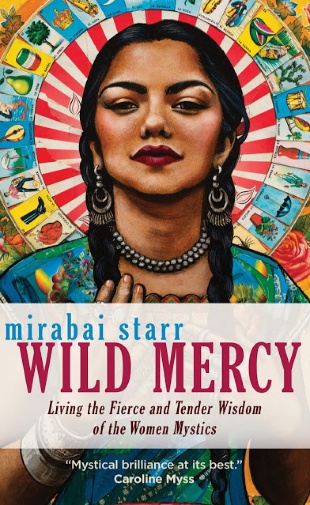"There is a secret fiesta going on in the wildwood, and you are invited. This party has been unfolding for millennia," writes Mirabai Starr, who has for many years been challenging us to activate the feminine wisdom within and bring it to bear on the dangerous power plays, ethical warps, and wayward social, political, and environmental excesses of our times. She calls a combination of fierce courage with the spiritual practices of forgiveness, compassion and love "wild mercy."
Starr, who is profiled in S&P's Living Spiritual Teachers Project, has been hosting mystical gatherings in the wildwood with her books God of Love, Caravan of No Despair, and other well-received volumes. We are gratified to have her e-course "One Love: Navigating Life by Heart" in our on-demand system; in this program she explores unitive consciousness, embodied spirituality and the immanence of the Holy One, turning within to the ethical teachings imprinted on our hearts, and the connection between personal suffering and longing for God.
We've been looking forward to this new book, and we can already pronounce that it will be on our list of the Best Spiritual Books of 2019. With great joy, reverence, wonder, and devotion, Starr has teased out "a healing elixir in the feminine experience that has been historically relegated to the fringes and that I believe the human family is ready to reclaim at last." She continues: "I believe in the healing energy of the feminine as a fire that can melt the frozen heart of the world, the artistry that will reweave the tattered web of interconnection."
In a majestic and shiver-producing emotional élan, the author presents an opening "Prayer to the Shekinah" (see excerpt) which sets the impressive depth and sweep of Wild Mercy. Here Starr pays homage to Shekinah as the feminine face of the Holy, the indwelling presence of the Divine, the Sabbath Bride, the Beloved, the Great Mother, and more.
In twelve breath-taking chapters, Starr then opens our hearts and minds to an amazing and eclectic array of wise women from all religious and spiritual traditions including Kuan Yin, Tara, Sophia, Mother Mary, Mirabai, Saint Teresa of Avila, Kali, Durga, Our Lady of Guadalupe, Gaia, Hildegard of Bingen, Rabia Basrit, Gangali, Mary Magdalene, and a whole host of others.
What can we (both women and men) learn from these wise women? By cultivating the contemplative life, we can tap into the private and public benefits of turning inward. While so many of us are exhausted and work-driven, we can harvest the restorative peace of keeping the Sabbath Holy. We can make the most of the spiritual practices of yearning and sexual embodiment. We can find true fulfilment in mothering as a path of awakening. We are called to take care of the Earth and savor the creativity of the arts. We can commit to forgiveness as an art of mercy. We can take seriously the ultimate spiritual practice of dying. After reflections on each lesson, Starr offers simple writing exercises and spiritual practices for deepening your understanding.
In a time when women around the world are uniting against the patriarchal power of men and exposing the sexual exploitation of women, Starr counsels wise women to "take refuge in the companionship of women" and to ponder the lessons of "the brave women who have walked before us." Their legacies give us hope, courage, and commitments to justice, service, and transformation.
